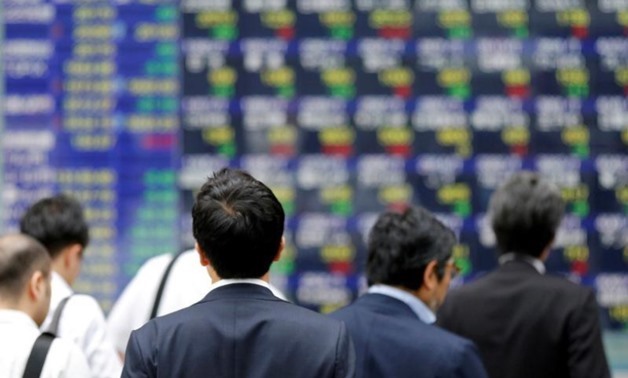
People walk past an electronic stock quotation board outside a brokerage in Tokyo, Japan, September 22, 2017. REUTERS/Toru Hanai/File Photo
TOKYO - 2 August 2018: Asian stocks tumbled on Thursday as the latest escalation in the Sino-U.S. trade war hit Chinese shares, while global bond markets were rattled by increased borrowing by Washington and Japan’s new tolerance for higher yields.
European shares are expected to fall, with financial spread-betters see Britain’s FTSE, France’s CAC, Germany’s DAX opening 0.4 percent lower.
Japan’s Nikkei declined 1.1 percent while MSCI’s broadest index of Asia-Pacific shares outside Japan dropped 1.5 percent, dragged down by a 2.2 percent fall in Chinese H-shares.
The CSI 300 index of China’s A-shares dropped 3.0 percent to 2,741, near its 1 1/2-year low of 2,691 set on July 6. Shares of export-dependent electronics firms fell 4.1 percent.
Hong Kong’s Hang Seng Index fell 2.5 percent to 10-month lows while an index of Chinese start-up firms sank 3.5 percent to its lowest level since January 2015.
“Market sentiment was dampened by renewed trade war fears,” said Zhang Quan, an analyst at Huaan Securities. “But investors need not be overly pessimistic as China is taking steps to hedge the risks from trade frictions with the United States, including monetary and fiscal policy easing.”
The U.S. administration on Wednesday increased pressure on China for trade concessions by proposing a higher 25 percent tariff on $200 billion worth of Chinese imports.
“If it had not been for the sideswipe on trade, markets would have been in much better shape this week. Apple’s earnings were super, helping to quell concerns about high-tech companies,” said Hirokazu Kabeya, chief global strategist at Daiwa Securities.
“The BOJ’s policy tweaks weren’t much of a tightening, and did little damage,” he added.
MSCI’s gauge of stocks across the globe is down 0.45 percent so far this week, reversing gains from the previous four weeks, with Chinese shares accounting for the bulk of that.
On Wall Street, the S&P 500 lost 0.10 percent on Wednesday, but the Nasdaq Composite added 0.46 percent to extend its recovery from Monday’s three-week low.
While industrial stocks fell 1.3 percent on trade worries, technology shares were boosted by strong earnings from Apple.
The world’s largest company by market capitalization rose 5.9 percent, boosting its value to close to $1 trillion.
The Federal Reserve kept interest rates unchanged on Wednesday, as expected, characterizing the U.S. economy as strong and staying on track to increase borrowing costs in September and likely again in December.
While that surprised nobody, U.S. bond yields rose, with the benchmark 10-year yields breaking above 3 percent to 2-1/2-month highs, after the U.S. Treasury said it would boost borrowing in the bond market in the coming quarter.
LOOSENING GRIP
Global bond markets were also rattled by sharp rises in Japanese bond yields since the Bank of Japan loosened its grip on long-term yields on Tuesday.
The 10-year Japanese government bond yield rose to a 1-1/2-year high of 0.145 percent. It last stood at 0.120 percent. The BOJ conducted an unplanned buying in 10-year JGBs in the afternoon, curbing rise in the yields.
Worries that higher yields in Japan may prompt Japanese investors to repatriate funds hit European bonds, boosting German and French yields to seven-week highs on Wednesday.
In the foreign exchange market, major currencies were little moved.
The euro changed hands at $1.1650, while the yen stood at 111.56 yen to the dollar.
The British pound was steady at $1.3101 ahead of an expected rate hike by the Bank of England later in the day.
The Chinese yuan held relatively stable at 6.8308, almost flat on the day.
Oil prices climbed a tad after two days of heavy losses on a surprise increase in U.S. crude stockpiles.
Brent crude futures rose 0.3 percent to $72.63 per barrel after a 2.5 percent fall the previous day.
U.S. West Texas Intermediate (WTI) crude futures edged up 0.2 percent to $67.78 a barrel after Wednesday’s 1.6 percent fall.


Comments
Leave a Comment